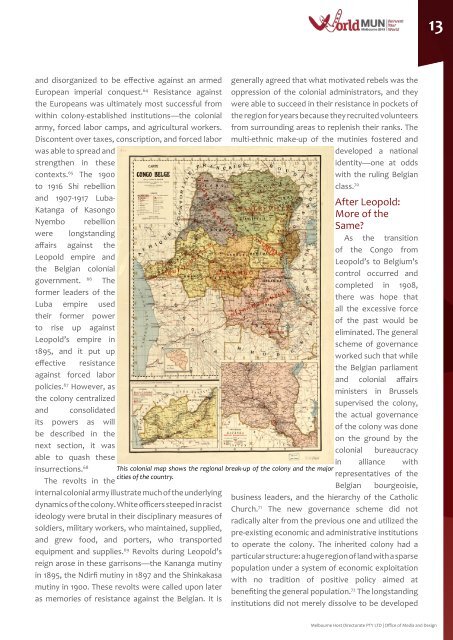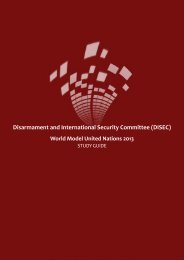Historical Security Council - World Model United Nations
Historical Security Council - World Model United Nations
Historical Security Council - World Model United Nations
Create successful ePaper yourself
Turn your PDF publications into a flip-book with our unique Google optimized e-Paper software.
and disorganized to be effective against an armed<br />
European imperial conquest. 64 Resistance against<br />
the europeans was ultimately most successful from<br />
within colony-established institutions—the colonial<br />
army, forced labor camps, and agricultural workers.<br />
Discontent over taxes, conscription, and forced labor<br />
was able to spread and<br />
strengthen in these<br />
contexts. 65 the 1900<br />
to 1916 Shi rebellion<br />
and 1907-1917 Luba-<br />
Katanga of Kasongo<br />
Nyembo rebellion<br />
were longstanding<br />
affairs against the<br />
Leopold empire and<br />
the Belgian colonial<br />
government. 66 the<br />
former leaders of the<br />
Luba empire used<br />
their former power<br />
to rise up against<br />
Leopold’s empire in<br />
1895, and it put up<br />
effective resistance<br />
against forced labor<br />
policies. 67 However, as<br />
the colony centralized<br />
and consolidated<br />
its powers as will<br />
be described in the<br />
next section, it was<br />
able to quash these<br />
insurrections. 68<br />
The revolts in the<br />
internal colonial army illustrate much of the underlying<br />
dynamics of the colony. White officers steeped in racist<br />
ideology were brutal in their disciplinary measures of<br />
soldiers, military workers, who maintained, supplied,<br />
and grew food, and porters, who transported<br />
equipment and supplies. 69 cities of the country.<br />
Revolts during Leopold’s<br />
reign arose in these garrisons—the Kananga mutiny<br />
in 1895, the Ndirfi mutiny in 1897 and the Shinkakasa<br />
mutiny in 1900. These revolts were called upon later<br />
as memories of resistance against the Belgian. it is<br />
generally agreed that what motivated rebels was the<br />
oppression of the colonial administrators, and they<br />
were able to succeed in their resistance in pockets of<br />
the region for years because they recruited volunteers<br />
from surrounding areas to replenish their ranks. The<br />
multi-ethnic make-up of the mutinies fostered and<br />
developed a national<br />
identity—one at odds<br />
with the ruling Belgian<br />
class. 70<br />
After Leopold:<br />
More of the<br />
Same?<br />
As the transition<br />
of the Congo from<br />
Leopold’s to Belgium’s<br />
control occurred and<br />
completed in 1908,<br />
there was hope that<br />
all the excessive force<br />
of the past would be<br />
eliminated. the general<br />
scheme of governance<br />
worked such that while<br />
the Belgian parliament<br />
and colonial affairs<br />
ministers in Brussels<br />
supervised the colony,<br />
the actual governance<br />
of the colony was done<br />
on the ground by the<br />
colonial bureaucracy<br />
in alliance with<br />
representatives of the<br />
Belgian bourgeoisie,<br />
business leaders, and the hierarchy of the Catholic<br />
Church. 71 The new governance scheme did not<br />
radically alter from the previous one and utilized the<br />
pre-existing economic and administrative institutions<br />
to operate the colony. the inherited colony had a<br />
particular structure: a huge region of land with a sparse<br />
population under a system of economic exploitation<br />
with no tradition of positive policy aimed at<br />
benefiting the general population. 72 This colonial map shows the regional break-up of the colony and the major<br />
the longstanding<br />
institutions did not merely dissolve to be developed<br />
13<br />
Melbourne Host Directorate PTY LTD | Office of Media and Design
















